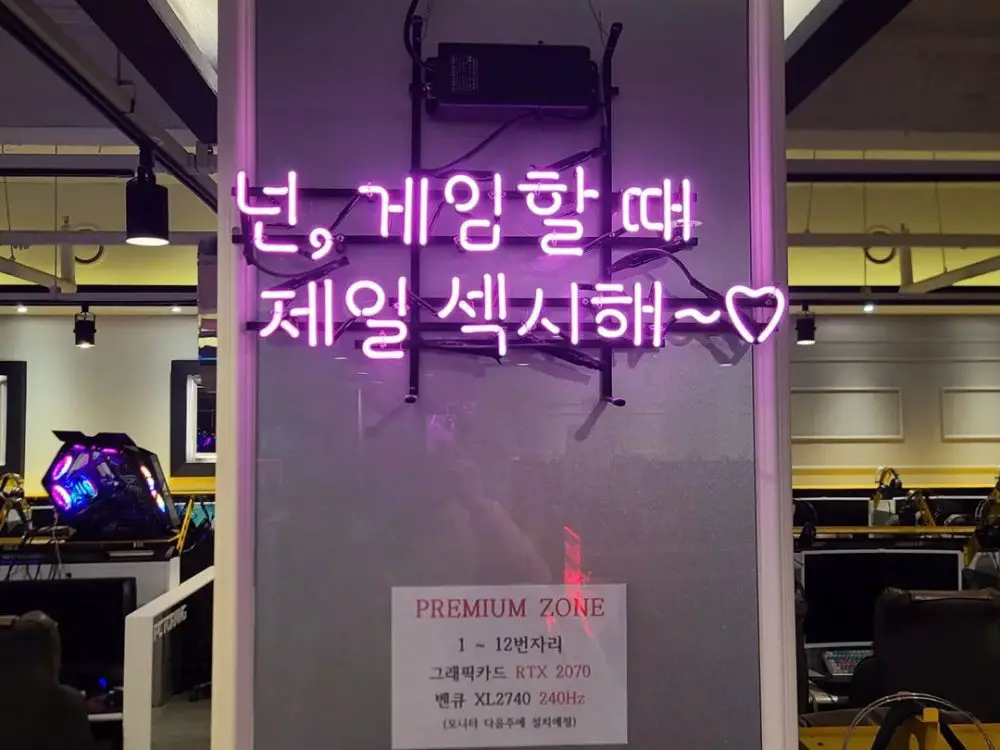South Korea is well known for its video game culture. There, video games have become a huge part of pop culture and are much more socially accepted.
Consoles might rule the rest of the world, but in South Korea, gamers play on computers. After school, students will often rush over to PC bangs, which are special LAN gaming centers that focus on a multiplayer gaming experience. While open to everyone, most PC bang regulars are teenagers and young adults.
Usually open for 24 hours, there are all types of customers coming in at different times. At a PC bang, prospective players pay by the hour, with rates as low as around 50 cents USD per hour. Because of the low price and 24-hour availability, some of the more intense competitive gamers will stay all night grinding out their favorite games. There are even games that have added perks when playing in a PC bang, like special items or in-game events. With high-speed internet, LAN capabilities, cheap hourly rates and even food delivered right to your computer, it’s obvious to see why PC bangs are so popular in South Korea.
South Korea has the fastest internet connection speed in the world. It was one of the first countries to focus on the research and the infrastructure needed to fully deploy the internet across their nation; in 1995, South Korea’s government implemented a 10-year program that laid the groundwork for national broadband coverage by 1998. The heavy emphasis on laying down a strong foundation for internet speed pays off today, as the country consistently holds the top spot in the worldwide internet speed rankings. Because of this, competitive gaming can be taken to another level.
Playing online multiplayer games that connect to remote servers can be hard, especially with servers that cross into other regions of the world. To make things worse for some of us, internet costs are going up in the United States, which makes it even harder to try and match the connectivity speeds of South Korea. Consequently, some video games have set up their own regional servers based specifically in South Korea. This has created a unique gaming environment around the world, with some international players even trying to hop onto these servers to play with South Korean players.
Even though esports has been slowly conquering the world — ESPN even has an esports section on their website now — it is particularly huge in South Korea. Many young South Korean gamers strive to become esports competitors and livestreamers, which only adds to the hyper-competitiveness of their online player versus player video game scene. The most played game in South Korea currently is League of Legends, and nearly half of all players gaming in a PC bang will be playing the multiplayer online battle arena game.
In League of Legends, players on teams of five fight against each other, trying to get to the other team’s base and destroy their Nexus. While the game came out in 2009, the free-to-play aspect and constant updates along with its bustling esports scene have kept it fresh for players and viewers alike. The game’s popularity has helped it become a bigger cultural pillar than just a video game; it has its own virtual K-pop group (with a real music video!) and even a Netflix series released in November 2021.
Lee Sang-hyeok is an influential South Korean League of Legends esports athlete and livestreamer. Known online as Faker, Lee has won the League of Legends World Championship three times, more than any other player except Bengi — who he’s tied with. He’s so popular that it’s said that he is one of the biggest reasons why esports is so prominent in South Korea. At only 25, Lee makes around $5 million every year from endorsement and merchandise deals and is expected to have made around $1 million in prize money so far.
While Faker is considered the top of the heap, all League of Legends esports streamers make an average of $200,000 a year, not including promotions and sponsorship deals. With people like Faker to look up to, it’s no surprise that more and more South Korean students are leaving behind dreams of other careers and starting to look toward training to become professional gamers. Such a large number of young people vying to go pro lends itself to creating a more intense multiplayer gaming scene.
In addition to League of Legends, South Korean players also play a lot of PlayerUnknown’s Battleground. PUBG is a third-person shooter that revolves around a battle-royale mechanic: Players aim to be the last left alive in games hosting up to 100 players while the radius of the safe zone gradually shrinks, making the playable space smaller and smaller each round. In particular, the popularity of PUBG in South Korea gave it immunity against the Fortnite fever that seemed to infect every other part of the world.
South Koreans usually prefer South Korean-made games over international ones, so the Korean-developed PUBG remains a top-played game. In addition to this, PUBG’s battle royale mechanic actually came before Fortnite’s, even though the latter seems to have gotten most of the praise for the popularization of the game mode.
The world continues to watch South Korea’s impact on the video game industry. South Korea seems to always be on the cutting edge of what’s next in gaming, and video game companies are starting to realize it. Video games are increasingly developed with PC bang culture in mind. Gamers from South Korea are becoming a huge percentage of who’s playing games, who’s streaming games, who’s watching games and recently, even who’s developing games. We’ll have to wait and see what the next wave of video games looks like, but one thing is for sure — South Korea will be riding it before the rest of us.
















